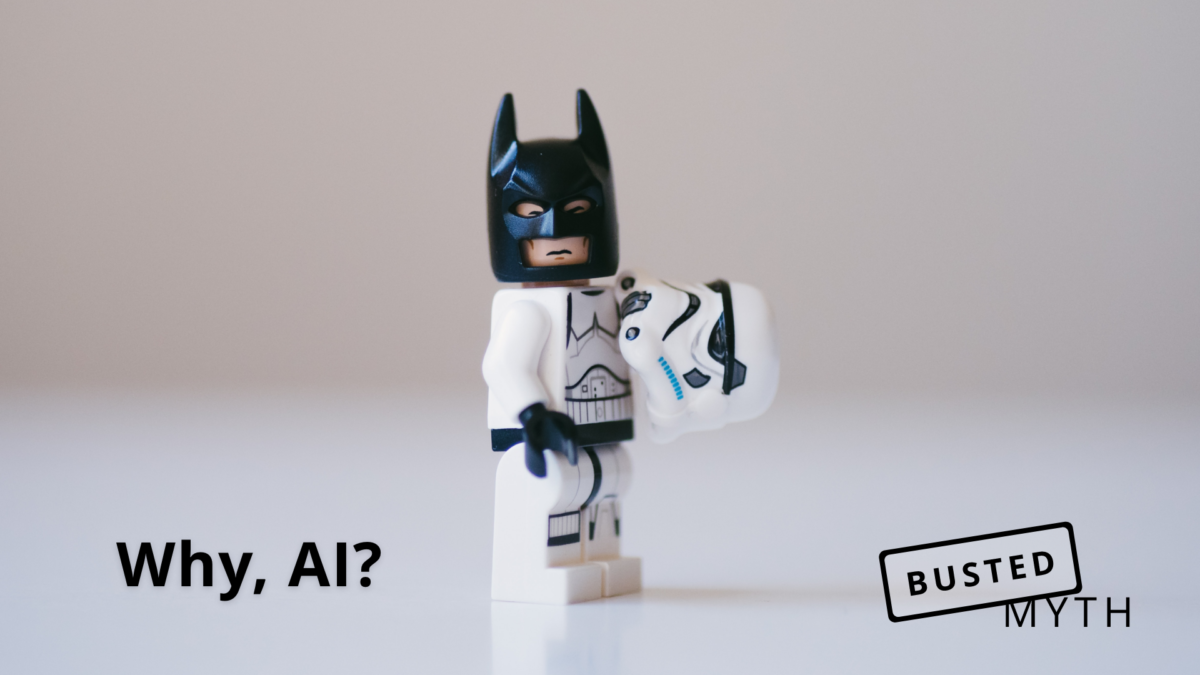
Issues in focus
Why, AI?
Unraveling myths about automation, algorithms, society and ourselves
Everyone talks about Artificial Intelligence (AI). But how does it change society? And how can we use it to help society? For that, we need to understand how AI works and how we can make it work for us. We need to get this right, because there is so much to get wrong. This is why we have put together this online learning space. We hope that with “Why, AI?” you learn a little more about how AI impacts the world. And how we need to change AI before it changes us...
Introduction video with Matthias C. Kettemann and Daniela Dicks
About
This learning space helps you to find out more about the myths and truths surrounding automation, algorithms, society and ourselves. It is continuously being filled with new contributions.
Myth: AI Models are abstract and do not need personal data
In supervised machine learning, models are based on abstractions from training data. The models themselves, while structurally influenced by the training data, do not contain the data themselves. It therefore…
Myth: AI can accurately predict and optimize human behavior
People analytics promises to objectify and optimize employee-related decisions. Managers place high expectations on these tools, especially with a growing number of employees who work from home.
Myth: AI will save us from climate change
AI provides powerful tools to tackle climate change in various applications. It can support the mitigation of climate change, for instance, by helping reduce greenhouse gas emissions within various applications.
Myth: AI treats everyone equally and makes predictions fairly
Algorithmic power is accumulated at the hands of data companies that re-enforce new colonial dynamics.
Myth: AI is disrupting knowledge work
Recently, applications based on machine learning have made enormous progress and can now take over tasks such as translations, document search or image recognition.
Myth: AI understands me, but I can’t understand it
We can contribute multiple perspectives to designing and implementing AI systems that impact us all differently.
Myth: AI algorithms decide what you see online
One myth posits that AI algorithms are tools used unilaterally by corporations to control what we see; the other argues that these algorithms are mere mirrors, and we are the...
Myth: AI will end discrimination
We approach the de-mystification of this claim by looking at concrete examples of how AI (re)produces inequalities and connect those to several aspects which help to illustrate socio-technical entanglements.
Myth: AI will kill us all!
AI is used in various military applications – supporting new concepts of command and control and enabling autonomous targeting functions. This accelerates warfare and erodes human control, causing legal &...
Myth: What you do with AI in the bedroom is your own thing
While sexuality is considered to be something private, the sex robot reproduces the public/private divide by reinforcing the idea that a feminized caregiver is supposed to provide emotional support and...
Why, AI? – A new Online Learning Space
Everyone talks about AI. But how does it change society? For that, we need to understand how AI works and how we can make it work for us.
Anja Dahlmann
AI will kill us all
João Carlos Magalhães
AI decides what you see online
Pinar Tuzcu
AI treats everyone equally and makes predictions fairly
Christoph Sorge
AI Models are abstract and do not need personal data
Constanze Erhard
What you do with AI in the bedroom is your own thing
Sarah Ciston
AI understands me, but I can't understand it
Raphaela Kotsch & Marcus Voß
AI will save us from climate change
Miriam Fahimi & Philipp Lücking
AI will end discrimination
Hendrik Send
AI is disrupting knowledge work
Sonja Köhne & Miriam Klöpper
AI can accurately predict and optimize human behavior
Team
Matthias C. Kettemann & Daniela Dicks (curators), Christian Grauvogel (concept), Katharina Mosene (research), Marie-Therese Sekwenz & Frederik Efferenn (communication), Katrin Werner (communication & website), Lukas Fox (website) and Larissa Wunderlich (design).
Supported by
Hosted by the Humboldt Institute for Internet and Society (HIIG) in the framework of the AI & Society Lab and the Research Group Global Constitutionalism and the Internet. In cooperation with the Leibniz Institute for Media Research | Hans-Bredow-Institut (HBI), Junges Forum: Technikwissenschaften (JF:TEC), the Sustainable Computing Lab of the Vienna University of Economics and Business (SCL), the Section International Law of the Internet of the Max Planck Institute for Comparative Public Law and International Law (MPIL) and OESA e.V.
Contact
Let’s continue a conversation about what we want AI to do to – and what we want to do with AI! We look forward to hearing from you at whyai@hiig.de.









